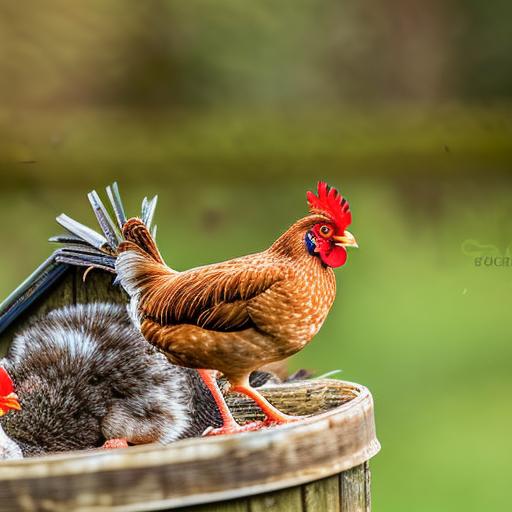In recent years, there has been a significant rise in the number of people choosing to raise chickens in urban areas. What was once a practice primarily found in rural communities has now become a popular trend in cities and suburbs. This increase in urban chicken ownership can be attributed to a variety of factors, including a desire for sustainable living, the appeal of fresh eggs, and the therapeutic benefits of caring for animals.
The history of urban chicken ownership dates back centuries, with chickens being kept in cities for their eggs and meat. However, as cities became more industrialized and urbanization increased, the practice of keeping chickens in urban areas declined. It wasn’t until the early 2000s that the trend began to resurface, with more and more people realizing the benefits of raising chickens in their own backyard.
Key Takeaways
- Urban chicken ownership is on the rise.
- Free-roaming chickens can cause problems.
- Chickens love porches, but this can be risky.
- Keeping chickens out of your porch requires effort.
- Chicken-proof fences, motion-activated sprinklers, and natural deterrents can help.
The Problem with Free-Roaming Chickens
While the idea of free-roaming chickens may seem idyllic, it can actually pose several problems for both homeowners and the chickens themselves. Free-roaming chickens can cause damage to gardens and property, as they have a tendency to scratch and peck at the ground. This can result in destroyed flower beds, uprooted plants, and damaged lawns.
In addition to the damage they can cause, free-roaming chickens also pose a danger to themselves and others. They are at risk of being attacked by predators such as dogs or raccoons, and they can also spread diseases to other animals and humans. Furthermore, their droppings can create unsanitary conditions and attract pests such as flies and rodents.
Why Chickens Love Porches
One of the reasons why chickens are drawn to porches is because they provide shelter and warmth. Porches offer protection from the elements, including rain, wind, and extreme temperatures. Chickens also enjoy the elevated vantage point that porches provide, allowing them to keep an eye out for potential predators.
Porches also offer a sense of security for chickens, as they are typically attached to the house and therefore closer to their owners. Chickens are social animals and thrive on human interaction, so being near their owners can provide them with a sense of comfort and companionship.
The Risks of Porch Poultry
| Risk Factor | Description | Potential Consequences |
|---|---|---|
| Disease Transmission | Poultry can carry and transmit diseases such as salmonella and avian influenza. | Illness or death in humans and other animals. |
| Noise Pollution | Roosters can be loud and disruptive, causing noise pollution in residential areas. | Disturbance of peace and quiet, potential legal action. |
| Odor | Poultry waste can produce strong and unpleasant odors, especially in large quantities. | Offensive smells, potential health hazards. |
| Predator Attacks | Poultry can attract predators such as raccoons, foxes, and coyotes. | Injury or death of poultry, potential danger to other pets and humans. |
| Property Damage | Poultry can cause damage to gardens, lawns, and other property. | Costly repairs and replacements. |
While having chickens on your porch may seem like a convenient and charming idea, it comes with its fair share of risks and challenges. One of the main problems that come with having chickens on your porch is the mess they can create. Chicken droppings can be unsightly and difficult to clean, and they can also pose health risks.
Chicken droppings can contain harmful bacteria such as Salmonella and E. coli, which can cause illness in humans. These bacteria can be easily spread through contact with contaminated surfaces or by inhaling dust particles that contain dried droppings. Therefore, it is important to take precautions when dealing with chicken droppings and to maintain a clean and sanitary porch environment.
How to Keep Chickens Out of Your Porch
If you want to keep chickens off your porch, there are several simple steps you can take. First and foremost, it is important to establish boundaries and make it clear to the chickens that the porch is off-limits. This can be done by using physical barriers such as fences or gates, or by using visual deterrents such as scarecrows or reflective tape.
Another effective method is to make the porch area less appealing to chickens by removing any food sources or nesting materials. Chickens are attracted to areas where they can find food or shelter, so by eliminating these resources, you can discourage them from coming onto your porch.
Maintaining a clean porch is also crucial in keeping chickens away. Regularly sweep or hose down the porch to remove any droppings or food scraps that may attract chickens. It is also important to seal any cracks or openings that chickens may use to access the porch.
Building a Chicken-Proof Fence

One of the most effective ways to keep chickens out of your porch is by building a chicken-proof fence. This can be done using a variety of materials, such as chicken wire, hardware cloth, or electric fencing. The key is to ensure that the fence is tall enough to prevent chickens from flying over it and that it is securely anchored to the ground to prevent them from digging under it.
When building a chicken-proof fence, it is important to consider the size and strength of the chickens you are trying to keep out. Some breeds of chickens are more adept at flying or digging than others, so it may be necessary to use additional measures such as netting or buried wire mesh to reinforce the fence.
Installing Motion-Activated Sprinklers
Another effective method for deterring chickens from your porch is by installing motion-activated sprinklers. These sprinklers are equipped with sensors that detect movement and automatically spray water when triggered. The sudden burst of water startles and scares away chickens, making them less likely to return.
Motion-activated sprinklers are a humane and environmentally friendly way to keep chickens off your porch. They do not cause any harm to the chickens, but simply provide a deterrent that encourages them to find another place to roost.
Natural Deterrents for Chickens
If you prefer a more natural approach to keeping chickens away from your porch, there are several plants and herbs that can repel them. Chickens have a strong sense of smell and are deterred by certain scents, so planting these herbs around your porch can help keep them at bay.
Some plants and herbs that repel chickens include lavender, mint, rosemary, marigolds, and garlic. These plants emit strong scents that chickens find unpleasant, making them less likely to come near your porch. Additionally, these plants can also provide other benefits such as attracting beneficial insects or repelling pests.
What to Do If You Have a Chicken Infestation
If you find yourself dealing with a chicken infestation on your property, it is important to take immediate action to address the problem. The first step is to identify the source of the infestation and determine how the chickens are gaining access to your porch. Once you have identified the entry points, you can take steps to block them off and prevent further access.
If the infestation persists despite your efforts, it may be necessary to seek professional help. Pest control companies or animal control agencies can assist in safely removing the chickens from your property and implementing measures to prevent future infestations.
Enjoying Chickens Without the Hassle
While there are certainly challenges and risks associated with having chickens on your porch, it is still possible to enjoy the benefits of owning chickens in urban areas without the hassle of porch poultry. By taking simple steps to keep chickens out of your porch, such as building a chicken-proof fence or installing motion-activated sprinklers, you can create a safe and enjoyable environment for both yourself and your chickens.
Owning chickens in urban areas can provide numerous benefits, including a sustainable source of fresh eggs, a connection to nature, and a sense of self-sufficiency. By implementing effective deterrents and maintaining a clean porch environment, you can enjoy all the advantages of urban chicken ownership without the drawbacks of porch poultry.
If you’re looking for ways to keep chickens off your porch, you might also be interested in learning about how to insulate a chicken coop. Insulating your coop can help regulate the temperature inside, keeping your chickens comfortable and preventing them from seeking shelter on your porch. Check out this informative article on how to insulate a chicken coop for tips and techniques to create a cozy and secure environment for your feathered friends.
FAQs
What are some reasons why chickens might be on my porch?
Chickens may be attracted to your porch because they are looking for food, water, or shelter. They may also be seeking a place to lay their eggs.
Why is it important to keep chickens off my porch?
Chickens can cause damage to your porch and leave behind droppings that can be unsanitary and difficult to clean. They may also attract other pests such as rodents.
What are some ways to keep chickens off my porch?
Some ways to keep chickens off your porch include using physical barriers such as fencing or netting, providing a designated area for them to roost and lay eggs, and removing any sources of food or water that may be attracting them.
Is it legal to keep chickens in my area?
Laws regarding keeping chickens vary by location. It is important to check with your local government or homeowner’s association to determine if it is legal to keep chickens in your area and if there are any specific regulations or requirements.
What are some benefits of keeping chickens?
Keeping chickens can provide a source of fresh eggs, fertilizer for your garden, and entertainment. They can also help control pests such as insects and weeds.
Meet Walter, the feathered-friend fanatic of Florida! Nestled in the sunshine state, Walter struts through life with his feathered companions, clucking his way to happiness. With a coop that’s fancier than a five-star hotel, he’s the Don Juan of the chicken world. When he’s not teaching his hens to do the cha-cha, you’ll find him in a heated debate with his prized rooster, Sir Clucks-a-Lot. Walter’s poultry passion is no yolk; he’s the sunny-side-up guy you never knew you needed in your flock of friends!







